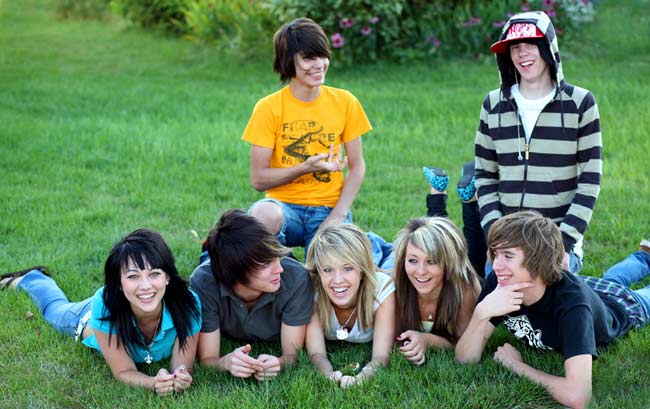Key to Teen Social Success Found

Get the world’s most fascinating discoveries delivered straight to your inbox.
You are now subscribed
Your newsletter sign-up was successful
Want to add more newsletters?

Delivered Daily
Daily Newsletter
Sign up for the latest discoveries, groundbreaking research and fascinating breakthroughs that impact you and the wider world direct to your inbox.

Once a week
Life's Little Mysteries
Feed your curiosity with an exclusive mystery every week, solved with science and delivered direct to your inbox before it's seen anywhere else.

Once a week
How It Works
Sign up to our free science & technology newsletter for your weekly fix of fascinating articles, quick quizzes, amazing images, and more

Delivered daily
Space.com Newsletter
Breaking space news, the latest updates on rocket launches, skywatching events and more!

Once a month
Watch This Space
Sign up to our monthly entertainment newsletter to keep up with all our coverage of the latest sci-fi and space movies, tv shows, games and books.

Once a week
Night Sky This Week
Discover this week's must-see night sky events, moon phases, and stunning astrophotos. Sign up for our skywatching newsletter and explore the universe with us!
Join the club
Get full access to premium articles, exclusive features and a growing list of member rewards.
Some teens are known by all to be popular. Others only feel popular. Both groups fit in equally well socially, a new study suggests.
"Teens' perceptions of their own social success may be a crucial predictor of long-term social functioning," said lead researcher Kathleen Boykin McElhaney, a psychologist at the University of Virginia, "such that even teens who are not broadly popular may demonstrate positive adjustment over time if they maintain a positive internal sense of their social acceptance."
Friend factors
To arrive at this conclusion, McElhaney and her colleagues had more than 160 teenagers report on measures of their perceived popularity, including social acceptance and ability to make friends. Each teen's popularity and other social factors were gleaned from interviews with friends (hand-picked by the participants). All teens completed the surveys at age 13 and again at 14.
Teens who reported fitting in, regardless of peer-rated popularity, were less hostile over time and more frequently sought out by their peers than other teens. The same was true for teens considered popular by peers, regardless of their own perceptions of popularity.
"When teens feel like they fit in, their closer friends are rating them increasingly as more fun to hang out with," McElhaney said. "They do well over time with their close friends."
The social misfits were the ones who ranked low on both scales — perceived popularity and peer-rated popularity.
Get the world’s most fascinating discoveries delivered straight to your inbox.
"Kids who are not on the radar screen at all in terms of popularity at school, and who did not see themselves as fitting in, showed increases in how hostile and aggressive they were rated," McElhaney said. "They were rated less desirably as companions over time."
Complex creatures
Popularity contests are generally external battles, as one doesn't get to select him or herself as the cool kid. Research has reflected this idea, particularly in studies of young kids, relying on peer ratings of popularity as the gold standard.
But perhaps, as the new study suggests, adolescents are more complex creatures than their non-hormonal juniors.
"During adolescence, you have to think about social acceptance and popularity more broadly, because teenagers' worlds are broader than kids' worlds are," McElhaney said.
Unpopular teens may feel socially accepted in a church youth group or sports team.
The results, detailed in the May/June issue of the journal Child Development, also may help teens justify the amount of time spent in the bathroom primping for school or on the phone gabbing about, uh, nothing.
"Sometimes adults — parents, teachers, guidance counselors — get impatient with how much teens can be invested in their social world," McElhaney told LiveScience. "Part of what this data says is that they're invested in social worlds for a reason. We can't say if it's causal, but certainly if a kid is not doing well socially, it's not a good sign."
The study was funded by the National Institute of Mental Health.
- Video: Attention Training for Kids
- 10 Things You Didn't Know About You
- Top 10 Mysteries of the Mind
Jeanna Bryner is managing editor of Scientific American. Previously she was editor in chief of Live Science and, prior to that, an editor at Scholastic's Science World magazine. Bryner has an English degree from Salisbury University, a master's degree in biogeochemistry and environmental sciences from the University of Maryland and a graduate science journalism degree from New York University. She has worked as a biologist in Florida, where she monitored wetlands and did field surveys for endangered species, including the gorgeous Florida Scrub Jay. She also received an ocean sciences journalism fellowship from the Woods Hole Oceanographic Institution. She is a firm believer that science is for everyone and that just about everything can be viewed through the lens of science.
 Live Science Plus
Live Science Plus





